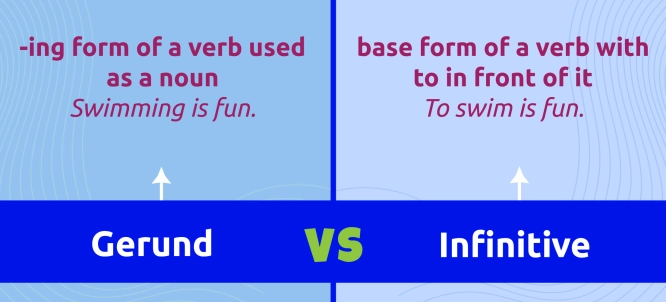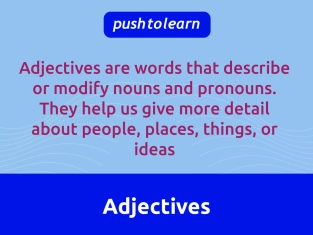by PushtoLearn
Gerund or Infinitive
Table of Contents
Gerund or Infinitive - Exercises
These exercises focus on Gerund vs Infinitive
What Are Gerunds and Infinitives?
Gerund (Verb + -ing)
A gerund is a verb form that functions as a noun. It is made by adding "-ing" to the base form of a verb.
✔ Example Sentences:
-
Swimming is fun. (Swimming = noun)
-
I enjoy reading books. (reading = object of the verb "enjoy")
Infinitive (to + base verb)
An infinitive is the base form of a verb, usually with "to" in front of it.
✔ Example Sentences:
-
She wants to travel. (to travel = object of "wants")
-
It’s important to study every day. (to study = subject complement)

When to Use a Gerund or Infinitive
Some verbs take a gerund, some take an infinitive, and some can take both with a change in meaning.
1. Verbs Followed by a Gerund (-ing Form)
Some verbs are always followed by a gerund.
|
Verb |
Example |
|
enjoy |
I enjoy playing football. |
|
dislike |
She dislikes waking up early. |
|
mind |
Do you mind opening the window? |
|
avoid |
He avoided answering the question. |
|
consider |
They considered moving to Canada. |
|
keep |
She keeps talking during class. |
|
finish |
We finished studying at 10 PM. |
|
stop |
He stopped smoking. |
2. Verbs Followed by an Infinitive (to + base form)
Some verbs are always followed by an infinitive.
|
Verb |
Example |
|
want |
I want to go home. |
|
decide |
She decided to study abroad. |
|
need |
We need to buy some milk. |
|
learn |
He is learning to drive. |
|
promise |
They promised to help us. |
|
agree |
She agreed to meet at 5 PM. |
|
plan |
We plan to visit Paris next year. |
|
hope |
I hope to see you soon. |
3. Verbs That Can Be Followed by a Gerund or Infinitive (With a Change in Meaning)
Some verbs can take both a gerund and an infinitive, but the meaning changes.
|
Verb |
Gerund Meaning |
Infinitive Meaning |
|
stop |
He stopped smoking. (He quit smoking.) |
He stopped to smoke. (He paused another action to smoke.) |
|
try |
Try calling her. (Attempt something as an experiment.) |
Try to call her. (Make an effort to call her.) |
|
remember |
I remember meeting him. (I have a memory of meeting him.) |
Remember to meet him. (Don’t forget to meet him.) |
Gerund vs. Present Participle – What’s the Difference?
Many students confuse gerunds with the present participle (-ing form used in continuous tenses).
✔ Gerunds act as nouns:
-
Swimming is good for health. (Gerund = subject)
✔ Present participles are used in verb tenses:
-
She is swimming in the pool. (Present participle in Present Continuous)
Gerunds and Infinitives in Everyday English
✔ At Work:
-
I need to finish this report by Monday. (infinitive)
-
She enjoys working with numbers. (gerund)
✔ In Daily Life:
-
Do you mind helping me with this bag? (gerund)
-
He decided to stay at home today. (infinitive)
✔ In Conversations:
-
I stopped drinking coffee last year. (gerund)
-
I stopped to drink some coffee before work. (infinitive, different meaning!)
Common Mistakes with Gerunds and Infinitives
❌ She wants going to the party. → ✅ She wants to go to the party.
❌ I enjoy to read. → ✅ I enjoy reading.
❌ He decided going to the gym. → ✅ He decided to go to the gym.
FAQs about Gerunds and Infinitives
What is the infinitive form of a verb?
The infinitive is the base form of a verb, usually with "to" (e.g., to eat, to run, to learn).
What is the difference between a gerund and an infinitive?
A gerund (-ing form) acts as a noun (I love swimming), while an infinitive (to + verb) expresses purpose or necessity (I want to swim).
How do I know when to use a gerund or an infinitive?
Some verbs always take a gerund (enjoy reading), some always take an infinitive (decide to go), and some change meaning (stop smoking vs. stop to smoke).
Are gerunds nouns?
Yes, gerunds act as nouns in a sentence (Swimming is my favorite sport).
Can a verb take both a gerund and an infinitive?
Yes, some verbs (e.g., stop, try, remember) take both but with a change in meaning (I stopped smoking vs. I stopped to smoke).

